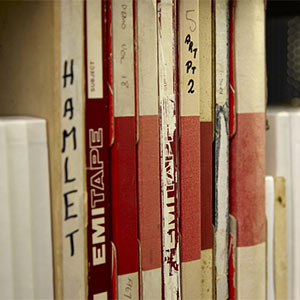
Inventing for radio and beyond
Digitising the work of Delia Derbyshire
In partnership with the School of Arts, Languages and Cultures, and the support of the Delia Derbyshire Estate, The University of Manchester Library has digitised a series of items related to the music and special sound created for freelance and BBC productions by Delia Derbyshire, with an emphasis on the four 'Inventions for Radio' she collaborated on with the dramatist Barry Bermange.
The material includes notes, written scores and correspondence in addition to recordings of make-up elements and isolated cues from the Inventions, all of which can be accessed by students, academics, practitioners and members of the public by appointment at the John Rylands Research Institute and Library.
Request access to the collection
About the project
 Delia Derbyshire (1937-2001) was a major figure in the development of electronic music in Britain and made a significant contribution to the public's understanding and awareness of the possibilities of electronic music. Based at the BBC Radiophonic Workshop from 1962-1973, she remains most famous for her realisation of the original theme tune for Doctor Who (1963) but contributed to a wide range of productions for theatre, radio, film, television and live 'happenings'.
Delia Derbyshire (1937-2001) was a major figure in the development of electronic music in Britain and made a significant contribution to the public's understanding and awareness of the possibilities of electronic music. Based at the BBC Radiophonic Workshop from 1962-1973, she remains most famous for her realisation of the original theme tune for Doctor Who (1963) but contributed to a wide range of productions for theatre, radio, film, television and live 'happenings'.
Among her finest works are the four 'Inventions for Radio', first broadcast on the BBC Third Programme across 1964 and 1965. The Inventions – The Dreams, Amor Dei, The After Life and The Evenings of Certain Lives – combined evocative electronic music, composed and realised by Derbyshire, alongside a collage of interviews conducted by the dramatist Barry Bermange with members of the public discussing, in the respective Inventions, the dream state, the existence of God, the notion of the afterlife and the experience of old age. These productions were groundbreaking not only for their formal properties but also because they provided a platform on national radio for everyday speech and, in particular, working class voices heard discussing profound philosophical concepts at a time when such coverage was extremely rare (indeed, the BBC received complaints from a number of listeners about some of the 'harsh' or 'uneducated' accents and opinions featured in the Inventions).
The productions have been described, by Derbyshire's close friend and colleague Brian Hodgson, as showcasing her 'at her elegant best'. Yet, the authorship, impact and influence of the Inventions has been difficult to determine. The works are not included in various academic accounts of British radio features and, in line with BBC policy at the time, Derbyshire did not receive public credit for her contribution to the productions with the four works being attributed to Barry Bermange as sole author.
This project provides a more complex and nuanced portrait of the creation of the Inventions and their subsequent impact and reception. Production notes and correspondence reveal that Derbyshire was more heavily involved in the editing process than was acknowledged publicly at the time and the reach of the Inventions was furthered by Derbyshire's request for an extract from the second Invention, Amor Dei, to be included in a concert she contributed to in 1966. The documents include details of the 1966 concert, letters from members of the public expressing their admiration for the Inventions as well as notes, scores and correspondence for surrounding productions and events Derbyshire contributed to, which place the Inventions in clearer context, including Time On Our Hands (1963), The Tower (1964) and the first edition of the Brighton Festival in 1967.
The digitised documents, along with the recordings of isolated cues and work-in-progress, expand and enhance our understanding of Derbyshire's achievements, not just with the Inventions but as a practitioner more broadly, and her status as a remarkable figure in British cultural history.
The material digitised for this project can be accessed by visiting researchers and members of the public and will also be available as a teaching resource for modules on audio production and radio features as well as outreach activities and events organised by Delia Derbyshire Day, which has been established as a registered charity to promote and foster understanding of the work of Delia Derbyshire and the development of British electronic music. The current project, then, reinforces the wider range of events taking place across 2017 to mark what would have been Derbyshire's 80th birthday.
